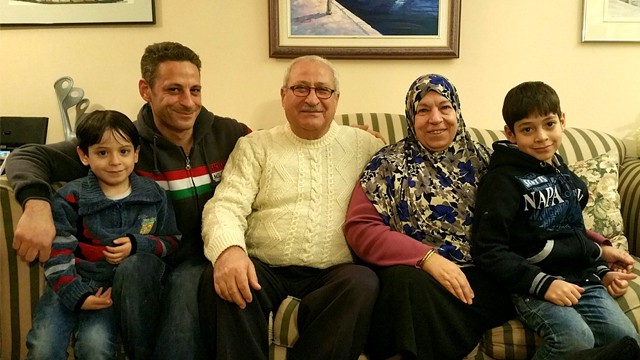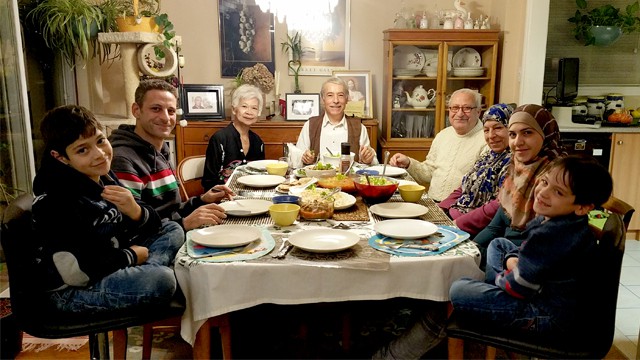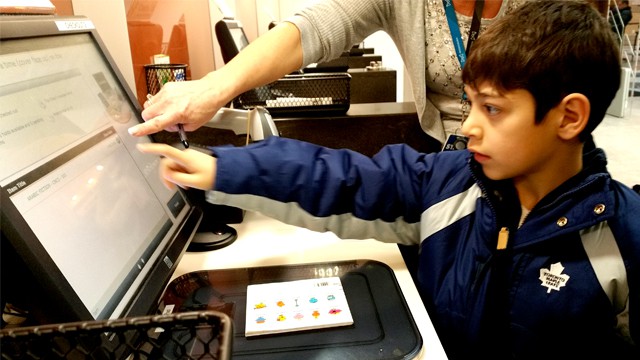Syrian Refugees Find New Life in Mississauga
Published January 15, 2016 at 3:18 pm

Although war is always tragic, there can be some silver linings. In the case of the Trabulsi and Al Sabbagh families, the horrific Syrian conflict led to Syrian-born Canadian Mike Trabulsi being reunited with his sister, Ikram, after 45 years apart. Now, three generations of the Al Sabbagh family (Ikram and her husband, their son and his wife and their two children) are reconnecting with family they thought they would never see again (or see at all).

That said, some members of the Al Sabbagh family never wanted to leave Syria.
 Three generations of the Al Sabbagh family from left to right: Ezz El Din (youngest son), Anwar Al Sabbagh (dad), Mouhamad Al Sabbagh, Ikram Trabulsi and Nour El Din (elder son).
Three generations of the Al Sabbagh family from left to right: Ezz El Din (youngest son), Anwar Al Sabbagh (dad), Mouhamad Al Sabbagh, Ikram Trabulsi and Nour El Din (elder son).
Mouhamad Al Sabbagh, the grandfather, had no intention of leaving the home he helped build with and for his family, even when bombs dropped precariously close to his Damascus residence.
When the bloody Syrian civil war first broke out in 2011, the Al Sabbagh family and their relatives were shaken but optimistic. Conflict wasn’t abnormal in their country and they expected the skirmishes to die down within a few weeks or months.
The fighting, however, only got worse.
In 2013, Mouhamad’s son Anwar decided to ignore a summons from the Syrian military and head to Lebanon to seek a safer home for his wife, two young sons and aging parents. While Anwar was setting up shop in Baalbek (a city a few hours outside of Beirut), his father — ever reluctant to leave his family home — received some terrible news while he was out of the country.
“Mouhamad’s sister wanted to travel to Dubai and he had a car, so he drove her to the Beirut airport because the airport in Damascus was closed,” explains Mike Trabulsi, Mouhamad’s brother-in-law. “Then, when he was about to go back, his daughter called him and told him that the house was demolished and not to bother coming back. They didn’t go back to Syria. There was no point.”

Late last week, we were welcomed into Mike and Linda Trabulsi’s home. We met the Trabulsi’s through their son Adam. Mr. Trabulsi was born in Syria and immigrated to Canada 45 years ago. In their home, we met Mr. Trabulsi’s sister, her husband Mouhamad, their son Anwar, their daughter-in-law Alaa and their eight and six-year-old grandsons Nour El Din and Ezz El Din. While the Al Sabbagh family was officially sponsored by the Canadian government and are settling in Mississauga as refugees, Mike and Linda are doing all they can to make sure the family’s difficult and lengthy transition to a new country, culture and climate is as seamless as possible.
After being displaced for several years, the family is happy to call Canada home.
“They lived in Lebanon for three years after leaving Damascus,” says Mr. Trabulsi.
“[They left] two years after the war started. There was bombing all around them and rebels were fighting It took them 45 years to build that house and within minutes it was all crushed down and there was no time to take anything, not even clothes. The same happened to the factory, which wasn’t far.”
Al Sabbagh Furniture was an established fine furniture company that employed 60 people. Over the course of the war, the family saw their home and livelihood destroyed. They also lost friends and neighbours.
“Two men they know were killed,” says Trabulsi. “As for the family, most of them managed to get away, but they know a lot of friends who were killed or injured during the war. When in Lebanon, they heard about other people they knew who were injured. Their next-door neighbour’s house was bombed and they were killed.”
Despite the tremendous ordeal and staggering loss, the family looks healthy and relaxed. Sitting on comfortable sofas in the Trabulsi’s warm, earth-toned home, everyone appears content and eager to share their story. Anwar and Alaa’s two young sons are in especially good spirits, playing with a smart phone and toy cars and climbing all over their charmed grandmother and doting father.
The family arrived in Canada on December 18 and is quickly learning how to navigate the new world they’re quite unexpectedly calling home. At this point, everyone’s English is rudimentary and Mr. Trabulsi has to translate.

Their story is, unlike so many others, one with a happy ending. The family is together and safe, having escaped death and catastrophic injury at the hands of rebels, ISIS and the ailing country’s military. As the war has progressed and worsened, so have tales of immense suffering. Many peaceful residents have been threatened or captured by warring factions desperately seeking recruits.
“I was born in Damascus,” Mr. Trabulsi explains. “I knew their house. I have pictures of their house when I was young and we were all handsome and I always look back at them. I came to Canada in April 1970. That was the last time I saw my sister. I haven’t been able to go back since that time because I deserted the army myself and when you leave the army, it’s a big deal.”
The tragic war that displaced the Al Sabbagh’s has stretched its tentacles far and wide, spawning terrorist cells and sewing conflict and distrust in nations far beyond Syria’s borders.

People fleeing harm have embarked on difficult and perilous journeys, languishing for months or years in a sort of limbo, unable to truly settle down in their temporary residences while awaiting settlement in far off countries in Europe and North America. ISIS/ISIL-related terrorist attacks have further complicated the refugee resettlement process, as some people in western countries have grown to fear immigration from regions torn apart by radicalized Islamic militants.
But politics aside, there’s something profoundly powerful about watching a family — a family just like any other — find peace. It’s even more powerful to see people reunited with loved ones, even under tragic circumstances.
“At the beginning, I thought it [the war] was something that was going to end within a few months,” Mr. Trabulsi says. “Then I started to worry the more time went by. We tried to help and send whatever we could. At times, I felt sick to my stomach. It was not easy to communicate with them, especially when they were still in Damascus.”
For the Al Sabbagh’s, the move to Canada, though lengthy, is celebrated.
“[My nephew Anwar] was just saying to me that even before they left Lebanon, they felt that the Canadian embassy in Lebanon was so kind to them and they were so welcoming. Once they were approved, they weren’t just a number. They started to feel the warmth from the Canadian government. When they arrived at the airport, they saw people welcoming them and offering them clothes and chocolate and even cigarettes.”
“Anwar says that he knew about Canada long before he came here. The reason he chose Canada is not just because we are here, but also because he knows that this is a really great country with no discrimination. You can come to Canada if you’re Muslim, Christian or Jewish. If you are black or white, you are welcome here. He knows that for the children, it will be a good country to grow up in. He was counting on his fingers and says there aren’t enough fingers to count how great this country is.”
When Mr. Trabulsi translated for Anwar, I couldn’t help but remember a line from a late 80s children’s movie called An American Tail. The animated 1986 Don Bluth film is about a family of Russian mice desperate to immigrate to America after spending far too much time hiding from dangerous, oppressive cats. When Fievel’s parents are explaining the move to him, his father insists that they must go to America because, “in America, there are no cats.”
Upon arrival in America — after being violently separated by evil Russian felines — they realize a very crucial thing.
There are indeed cats in America (which they learn shortly after singing an entire full-length song about a cat-free U.S of A.).
While you cannot compare Syria to Canada, it’s simplistic and naïve to assume that Anwar’s first impression — that there is no discrimination and everyone is welcome by everyone — is completely accurate. Canada has by and large been a wonderful home to people from all nations and the government has served (and continues to serve) refugees well. People have indeed lined up at Pearson to welcome newcomers with toys, coats and candy.
People have also pepper sprayed groups of refugees in Vancouver.
They have also disseminated petitions calling for a halt to the resettlement effort.
So while there are “cats in America,” we can only hope that the good cats outweigh the bad. For the Al Sabbagh’s, their experience has been good so far, even though they initially had some trouble securing a rental after the landlord of the first property they visited rejected them because of a lack of credit history (despite the fact that government is sponsoring the family and covering living expenses for one year). Fortunately for them, the second landlord they spoke with was sympathetic to their situation.
“I found the house they’re living in,” says Mr. Trabulsi.
“The landlord knew that they were immigrants and he’s an immigrant from India,” says Ms. Trabulsi. “He knew that people have to start somewhere somehow, so they were kind enough to really give us the opportunity. They didn’t mind that they were newcomers.”
While the family has only been here for a short time and has almost an entire year to get settled, the future weighs heavily on everyone’s minds. Both Ikram and Anwar have thought about employment and everyone is thinking about Ikram and Mouhamad’s health, as both are diabetic and Ikram has already lost a leg to the disease. Mr. Trabulsi said that Ikram is a talented seamstress and artist, able to sew and tailor clothing and sell artisanal crafts. Anwar is a skilled artist and tradesman, having designed and built furniture for years in his family factory. He also worked as a cook in a restaurant in Lebanon and is interested in the food industry.
The family is also wondering how to better immerse themselves in their new community by picking up hobbies and making friends. The language barrier creates a challenge, but they’ll be taking complimentary English classes soon.
When the interview wound down, everyone relaxed even more. The little boys commandeered Anwar’s smart phone and started taking pictures of our editor, Khaled. He made faces at the camera and they shrieked with laughter, running around the house and ambushing him with surprise shots.
Before we sat down to a beautiful meal of lamb, rice, chicken, soup and savory vegetable dishes, Anwar showed us photos of his hand-crafted furniture, including several artisanal custom pieces.

When the dinner ended, everyone shook hands and proffered warm and genuine goodbyes. Mouhamad stepped out into the chilly winter night to smoke an after-dinner cigarette. It was just like any dinner party, really, talk of loss and war aside.

“They said they still feel a little sad, having lived at home their entire lives,” Mr. Trabulsi said. “However, they don’t feel that there’s anything left for them to go back to. They’re okay with living here, especially after all this welcoming. They feel excited and happy to be here.”
Shortly after our initial meeting, the family and Khaled went to City Hall to visit Mayor Bonnie Crombie. She asked to meet the Al Sabbagh’s after seeing their picture on Facebook.
The family was invited into the board room and introduced to Crombie and Rose Vespa, the director of the library. They received some city-themed swag in the form of shirts and loot bags for the children as well as library cards.
The library cards were a huge hit and the family was excited to check out the city’s prized educational and literary space. The children browsed the Arabic and children’s section and got to, with the help of the warm and welcoming staff, sign out their first ever library books in Canada.

The experience seemed to give them a good and memorable impression of the city.
While it’s hard to say what the future holds for anyone, the forthcoming years look bright for a family who left everything they knew and loved behind for a better life in a safer and more peaceful country.
Here’s hoping they only meet good cats along the way.
INsauga's Editorial Standards and Policies